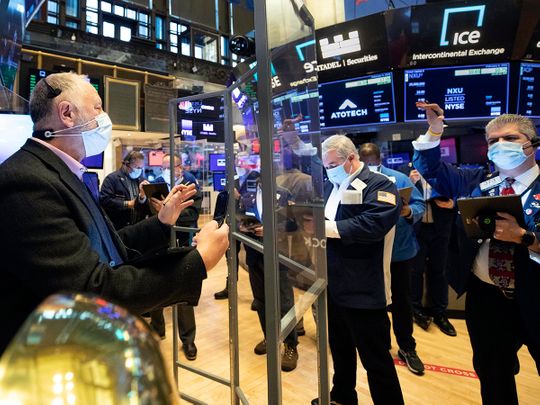
Dubai: The second quarter earnings season kicks off in the week ahead, with reports from US lending heavyweights JPMorgan Chase, Goldman Sachs and other major financial companies being released first.
Q2 earning season to begin
Earnings for top global companies are expected to be up sharply this quarter, compared to a year ago when economies are shut down because of the pandemic and business came to a standstill.
Banks including Wells Fargo, Bank of America, Citigroup, and Morgan Stanley among others are expected to provide an insight into their own performance in the second quarter but also into the US economy’s ongoing recovery.
US Consumer Price Index on Tuesday
On the economic front, the US Consumer Price Index is to be released on Tuesday and retail sales are expected Friday. CPI inflation rose at a higher than expected annual rate in May, and June could also be as hot. The US Federal Reserve has said it would allow inflation to rise above its targeted level.
Elsewhere in the world, China GDP and UK CPI are key economic events, along with key central bank monetary policy decisions from the Bank of Canada and the Bank of Japan.
Bank of Japan more likely to be dovish
With Tokyo in lockdown, the Bank of Japan is more likely to lean dovish at its meeting later in the week, but both the Bank of Canada and Reserve Bank of New Zealand (RBNZ) have reasons for optimism around their economies.
RBNZ could be looking to raise interest rates later this year if the economy continues to perform well, so analysts will be watching for signs of optimism from both those commodity-driven central banks.
New COVID-19 fears triggers uncertainty
The global spread of the more infectious delta variant of the COVID-19 virus remains a critical area of focus for traders.
The variant has now been identified in more than 100 countries, including those with high vaccine rates, and it even forced Tokyo to declare a state of emergency and prohibit spectators from this month’s Olympics as COVID-19 cases hit a 2-month high in country.
Is market uncertainty returning?
For traders who had written off the virus amidst widespread vaccine availability, at least in the developed world, last week’s delta-driven setbacks resulted in uncertainty plaguing market sentiments.
Analysts opine that investors should expect the continued ebb and flow of the virus to drive traders’ appetite for risk assets throughout the rest of the year and beyond.
US bond yields are dropping
US government bond yields are one of the most important indicators to watch. The yield on the benchmark 10-year US Treasury bond fell 12 basis points last week, one of the worst one-week slides in a year.
Traders worry that perhaps the Fed’s “transient” view of price pressures was correct after all and that we may be past peak inflation fears, even if the next couple months’ worth of inflationary figures remain elevated.
US bond weakness to help stocks
Ongoing weakness in US bond yields, if seen, would continue to support growth stocks, gold prices, and the broader commodity complex, potentially at the expense of the US dollar.
The first half of 2021 was a strong start for the economy and the global stock markets, but analysts view that the investment landscape is changing as the recovery has transitioned into expansion.
Will stock momentum continue?
Last week offered US labour market readings to Federal Reserve minutes to rising uncertainties around COVID-19 variants and their implications for global growth.
While stocks logged another solid week, touching new highs, the headliner was the move in interest rates, which have pulled back notably from their highs earlier this year.








